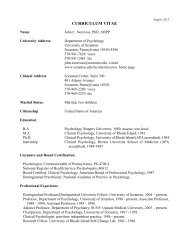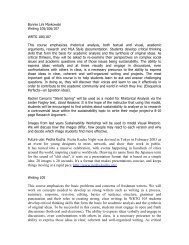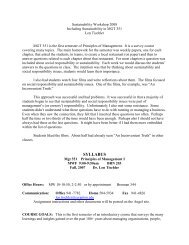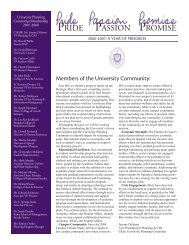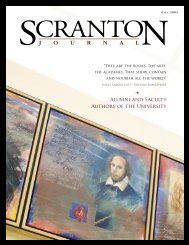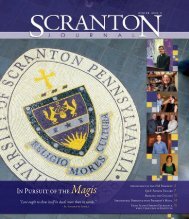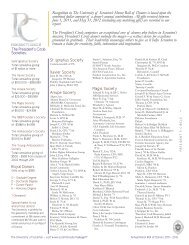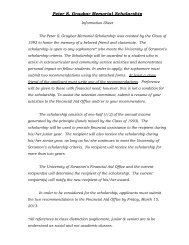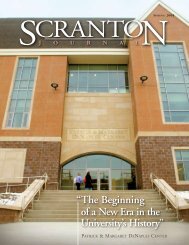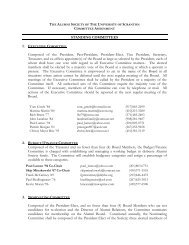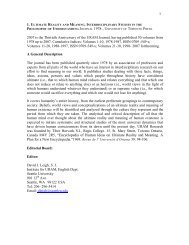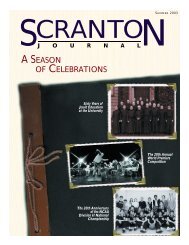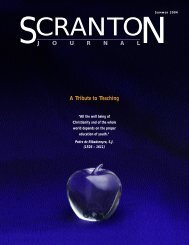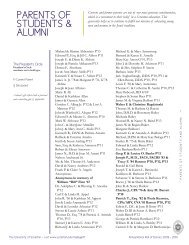winter 2009-2010 - The University of Scranton
winter 2009-2010 - The University of Scranton
winter 2009-2010 - The University of Scranton
Create successful ePaper yourself
Turn your PDF publications into a flip-book with our unique Google optimized e-Paper software.
Growing up in Mayfield, Pa.,<br />
Philip Dzwonczyk’s drive for<br />
academic achievement was supported<br />
by his culture and his<br />
community. Mayfield, a small town northeast<br />
<strong>of</strong> <strong>Scranton</strong>, was populated by descendents <strong>of</strong><br />
ethnic Russian immigrants from the Galicia<br />
province <strong>of</strong> Austria-Hungary.<br />
“It was a very close-knit community, and in<br />
traditional Russian culture, being a physician is<br />
highly regarded,” says Dr. Dzwonczyk, a biology<br />
major and chemistry minor at <strong>Scranton</strong>. “I<br />
was not unique. <strong>The</strong>re were other men my age<br />
from Mayfield going <strong>of</strong>f and becoming physicians.<br />
It wasn’t culturally predetermined, but it<br />
was culturally supported.”<br />
Dr. Dzwonczyk’s biggest encouragers were<br />
his parents. As a young man, his father had<br />
aspirations <strong>of</strong> becoming a physician, but<br />
because <strong>of</strong> the death <strong>of</strong> his brothers, the<br />
impact <strong>of</strong> the Great Depression, and then<br />
the United States’ entry into World War II,<br />
he never completed his studies.<br />
“It never happened for my father, but his<br />
circumstances were an inspiration for me,”<br />
Dr. Dzwonczyk says. “At the same time,<br />
if I had said I wanted to teach, my parents<br />
would have encouraged me as well. <strong>The</strong><br />
overwhelming cultural message to us growing<br />
up was that education was valued and<br />
not something our grandparents could have<br />
gotten back in the Old Country. It wasn’t<br />
acceptable to not want an education; we had<br />
to make the most <strong>of</strong> our talents.”<br />
At <strong>Scranton</strong>, the world opened up to<br />
Dzwonczyk. He found strong support<br />
among the faculty and administrators, who<br />
he says took a genuine interest in their students.<br />
Moreover, as Dr. Dzwonczyk<br />
describes, he was able to achieve his goal <strong>of</strong><br />
being accepted into an American medical<br />
school, but not at the expense <strong>of</strong> a liberal<br />
arts education.<br />
“<strong>The</strong> <strong>University</strong> <strong>of</strong> <strong>Scranton</strong> provided me<br />
with a completely rounded and full education,”<br />
he says. “<strong>The</strong> school was very strong in<br />
the area in which I majored, but, particularly<br />
at this point in my life, I value tremendously<br />
the courses I took in philosophy, theology, literature<br />
and more. I left there having some<br />
sense <strong>of</strong> where I fit in the world and in society.<br />
I think that is becoming increasingly rare.”<br />
After <strong>Scranton</strong>, he graduated cum laude<br />
from Jefferson Medical College <strong>of</strong> Thomas Jefferson<br />
<strong>University</strong>. Currently, the Norwich, N.Y.<br />
resident is chief <strong>of</strong> medical services at the New<br />
York State Veterans Home at Oxford, a position<br />
which he has held since 1993. He is also clinical<br />
associate pr<strong>of</strong>essor <strong>of</strong> medicine at the Clinical<br />
Campus <strong>of</strong> the Upstate Medical <strong>University</strong> in<br />
Syracuse where he is a member <strong>of</strong> the faculty <strong>of</strong><br />
the Geriatric Medicine Clerkship. Previously,<br />
Dzwonczyk was medical director <strong>of</strong> Herkimer<br />
County Hospice and a member <strong>of</strong> the Department<br />
<strong>of</strong> Medicine at Mary Imogene Bassett<br />
Hospital in Cooperstown.<br />
While others have a dim view <strong>of</strong> geriatrics<br />
as a specialty in which practitioners cannot<br />
make much <strong>of</strong> an impact on their patients,<br />
Dr. Dzwonczyk finds his<br />
work absolutely illuminating.<br />
“Geriatric and palliative<br />
medicine are areas in which<br />
you make a difference every<br />
day,” he explains. “I can’t cure<br />
most <strong>of</strong> my patients, but I can<br />
improve their function, alleviate<br />
their suffering, treat their<br />
depression and help them to<br />
enjoy their lives to a greater<br />
degree than they would have<br />
been able to without treatment.<br />
I find my work to be<br />
extremely rewarding.”<br />
In addition to his work as a<br />
practitioner, Dr. Dzwonczyk is an Executive<br />
Committee Member <strong>of</strong> <strong>Scranton</strong>’s Medical<br />
Alumni Council. <strong>The</strong> group assists undergraduate<br />
pre-health pr<strong>of</strong>essional students<br />
through education in health-related programs,<br />
networking assistance and guidance on<br />
admission to health pr<strong>of</strong>essional<br />
schools, and access to role models<br />
in various medical careers.<br />
“It’s a great opportunity to<br />
network and work with people<br />
<strong>of</strong> all ages who have shared<br />
<strong>The</strong> <strong>University</strong> <strong>of</strong> <strong>Scranton</strong><br />
experience,” Dzwonczyk says.<br />
“In some small way, being on<br />
the MAC Executive Committee<br />
allows me to support the<br />
career goals <strong>of</strong> so many young<br />
men and women, and to support<br />
a university that allowed<br />
me to achieve my goals in life.”<br />
75 ▼<br />
Philip Dzwonczyk, M.D.<br />
Networking and Service<br />
Draw Physician to<br />
Medical Alumni Council<br />
Since graduating from <strong>Scranton</strong> in 1975,<br />
Philip Dzwonczyk, M.D., has gone on to<br />
become chief <strong>of</strong> medical services at the<br />
New York State Veterans Home. Still,<br />
he remains engaged with his alma mater,<br />
serving as an Executive Committee<br />
Member <strong>of</strong> the Medical Alumni Council.<br />
19<br />
Generations <strong>of</strong> Alumni Keep the <strong>Scranton</strong> Legacy Alive



